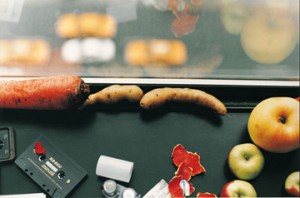
Wolfgang Tillmans, "still life, New York," 1995. Courtesy the artist and Galerie Daniel Buchholz, Köln/Berlin.
So there we have it. I suppose, at least, it means that we will all have the large part of our summer back. The glee that I took from the USA’s second round loss to Ghana was very much out of proportion compared to how little it mattered to me that either team went through to the quarter-finals. Antagonism between the USA’s football team and the European footballing nations is not based on the amount of talent in any side; the USA national football team is built with a fine regiment of athletes. I do believe that the problem is one to do with language. It seems alien for most football viewers to hear the USA’s national football team coach Bob Bradley to tell the post-match analysts that he and his squad had practiced certain plays, that it was physically draining on his players to have to go into overtime and that by the end of the first period the team had made too many mistakes on the field.
Yes, we lost yesterday. Worse still, we lost in a terrible manner. We showed little heart, little flair and little ambition. Not acceptable on the biggest stage. So now what to do? I suppose I should get to see some exhibitions. What do I want from a summer exhibition? I want something loud, I want something fun, and I want something ambitious. Ernesto Neto at the Hayward I’ve done. Howard Hodgkin in Oxford? Perhaps the Whitstable Biennial? We could stay the night and have a weekend by the sea. Douglas Gordon at Lisson Gallery? Too small. Picasso at Tate Liverpool! Hmm, they’re all a little bit out of the way. Oh wait, did you say fun, loud, ambitious, and a little bit silly? Right-O. I’ve got just the man. Really? Fantastic. Who is it? I just need to do anything to get the Germans out of my head. Ah, right, I see…
Wolfgang Tillmans has been the darling of hip British photography since Terry Jones, founder of seminal fashion magazine i-D, called his regular submissions “the eye of the magazine.” If one was so inclined, one could find a series of direct links between the photos that Tillmans took of pretty young things and the morning-afters that peppered fashion magazines in the early 1990s, and the seventeen year-olds that you see today clamoring through the French marche at Broadway Market in Hackney posing in café windows with their nonfat lattes. The only photographer (Gilbert and George, for obvious reasons, aside) to have won the Turner Prize (in 2000, when it may have still been relevant), rewarded with a large-scale solo show at Tate Britain in 2003 at the age of thirty-five, I believe that it is actually British law that every review of the artist’s work must make clear that the artist Wolfgang Tillmans “…was born in Germany but has lived in England for twenty years.” It would have been difficult to draw the crowds out of their homes and the pubs for an afternoon of gallery-hopping but the Serpentine Gallery’s major new retrospective of the German-born adopted-British artist (which opened Saturday 26th June) is everything that the West London gallery promises for their summer showcases: It’s loud, it’s ambitious, and it is lots of fun.
A quick web search on the topic of “social documentary” will bring up the kind of photography produced under extreme circumstances of people living under duress in the farthest-flung regions of the planet. Let us not pretend that Wolfgang Tillmans is risking his life in taking his pictures but – and here’s the rub – the reason that Tillmans is not just another artist but an internationally renowned star of modern photography is that his subjects are just as important. Gillian kisses Christopher on the cheek as they stand in a doorway. He has his arms around her but he looks past her, and I cannot figure out whether he’s bored or in love. Tillmans does not aggrandize his work. His portraits are soft, cerebral, and pensive — be they of Alex and Lutz or of the Concorde as it flies its final flights.
Tillmans’s work manages to convey an isolation caused by introspection without succumbing to mumblecore naval-gazing. Like Nan Goldin, his photographs are very much examinations of captured light and time. Time is something that Tillmans’s subjects never seem to have much remaining. In the photo-roman, Concorde (1997), he concludes, “For me and my generation there is no super future.” For the viewer who has grown up following Tillmans’s career, it can be frustrating to see it appropriated and re-appropriated to the point of saturation and inevitable dilution. It makes what’s important seem less important. For this show, Tillmans has dispensed with the lo-fi, low-content look of previous exhibitions and embraces the inherent beauty that he must be obviously aware that he captures.
When the turnover and à la mode nature of fashion mixes with the ephemeral manner of contemporary art, it can be easy to forget how important certain artists actually are. With this major retrospective show (at the age, it should be added, of forty-one), Tillmans takes the opportunity to not just reconsider his past work but to give us something of his spirit. The photographer Eamonn McCabe finishes every portrait sitting that he does with a handshake for his sitter combined with “Thank you for your photo.” With this retrospective, Tillmans is saying thank you to all of his sitters and to us, his audience. We are shown just why we love Tillmans, why he loves us, and why that love is justified. Fine, Germany, you can have the football but we get to keep Wolfgang. Deal?



